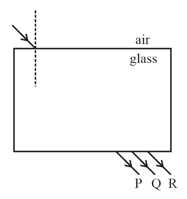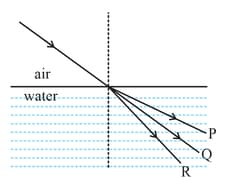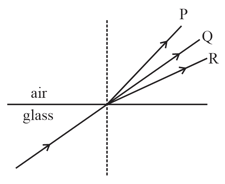Dr. K C Trikha and N K Sehgal Solutions for Chapter: Refraction and Dispersion of Light, Exercise 1: Something To Know
Dr. K C Trikha Science Solutions for Exercise - Dr. K C Trikha and N K Sehgal Solutions for Chapter: Refraction and Dispersion of Light, Exercise 1: Something To Know
Attempt the free practice questions on Chapter 10: Refraction and Dispersion of Light, Exercise 1: Something To Know with hints and solutions to strengthen your understanding. The Living World A book of Science and Technology solutions are prepared by Experienced Embibe Experts.
Questions from Dr. K C Trikha and N K Sehgal Solutions for Chapter: Refraction and Dispersion of Light, Exercise 1: Something To Know with Hints & Solutions
In the following figure, identify the light ray that would be the correct emergent ray. Give reason for your answer.

In the following figure, identify the light ray that would be the correct refracted light ray. Give reason for your answer.

In the following figure, identify the light ray that would be the correct refracted ray. Give reason for your answer.

We are given a convex lens of focal length . Draw a ray diagram to show the nature, size, and position of the image formed when the object is kept at a distance of . (Note: For drawing the ray diagram, use an appropriate scale.)
We are given a concave lens of focal length . Draw a ray diagram to show the nature, size, and position of the image formed when the object is kept at a distance of . (Note: For drawing ray diagrams, use an appropriate scale)
We are given a concave lens of focal length . Draw a ray diagram to show the nature, size, and position of the image formed when the object is kept at a distance of . (Note: For drawing ray diagrams, use an appropriate scale)
We are given a concave lens of focal length . Draw a ray diagram to show the nature, size, and position of the image formed when the object is kept at a distance of . (Note: For drawing ray diagrams, use an appropriate scale)
What type of lens is used as a 'magnifying glass'? How is the object positioned with respect to this lens? Draw the appropriate ray diagram.
